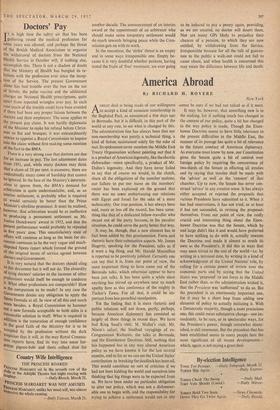America Abroad
By RICHARD H. ROVERE New York AGREAT deal is being made •of our willingness to accept a kind of associate membership in the Baghdad Pact, as announced a few days ago in Bermuda, but it is difficult, in this part of the world at any rate, to see what is changed by this. The administration line has always been that our non-membership was purely a technical thing, a kind of fiction maintained solely for the sake of tact. Its spokesmen never mention the Middle East Treaty Organisation without pointing out that it is a product of American ingenuity, like the electric dishwasher—mbre specifically, a product of Mr. Dulles's ingenuity. And they have never failed to say that of course we would, in the clutch, share all the obligations of the member nations; our failure to put .our name on the members' roster has been explained on the ground that there was no sense embarrassing our relations with Egypt and Israel for the sake of a mere technicality. Our true position, it has always been said, more or less off the record, has been some- thing like that of a dedicated fellow-traveller who stayed out of the party because, in his peculiar situation, he could serve the party better that way.
It may be, though, that a new element has in fact been added by this proclamation. Form and rhetoric have their substantive aspects. Mr. James Hagerty, speaking for the President, talks as if it were a big thing, and Mr. Harold Macmillan is reported to be positively jubilant. Certainly one can say that it is, from our point of view, the most important thing to have come out of the Bermuda talks, which otherwise appear to have been just talks. It has been quite a while since anything has stirred up anywhere, near so much apathy here as this conference of the mighty in Tucker's Town. For all that, it could be im- portant from less parochial standpoints.
Yet the feeling that it is mere rhetoric and public relations will not down, partly, perhaps, because American diplomacy has consisted so largely of those things in recent days. We have had King Saud's visit; M. Mallet's visit; Mr. Nixon's safari; the Sindbad voyagings of ex- Congressman Richards; the talks at Bermuda; and the Eisenhower Doctrine. Still, nothing that has happened has in any way altered American policy as we have known it for the' last several months, and so far as we can see the United States' contribution to breaking the deadlock has been nil. This would constitute no sort of criticism if we had not been kidding the world and ourselves into thinking that big things were to be expected from us. We have been under no particular obligation to alter our policy, which was not a dishonour- able one to begin with, and the responsibility for trying to achieve a settlement would not in any .sense be ours if we had not talked as if it were.
It may be, however, that something new is in the making, for if nothing much has changed in the content of our policy, quite a bit has changed in the way policy is made. Though the Eisen- hower Doctrine seems to have little relevance to the present difficulties in the Middle East, the manner of its passage has quite a bit of relevance to the future conduct of American diplomacy. As everyone must know by now, our Constitution gives the Senate quite a bit of control over foreign policy by requiring the concurrence of two-thirds of the Senate in effecting all treaties and by saying that treaties shall be made with the 'advice' as well as the `consent' of that chamber. Up to now, the' Senate has never con- strued `advice' in any creative sense. It has always either accepted or rejected the proposals that various Presidents have submitted to it. When it has had reservations, it has not tried, or at least it has not succeeded, in revising the proposals themselves. From our point of view, the really crucial and interesting thing about the Eisen- hower Doctrine was that the Senate, which by and large didn't like it and would have preferred to have nothing to do with it, actually rewrote the Doctrine and made it almost as much its own as the President's. It did this in ways that may seem trivial to the rest of the world—i.e. by writing in a terminal date, by writing in a kind of acknowledgment of the United Nations' role, by calling for a certain power of review over the economic parts and by saying that the United States was `prepared' to use force in the Middle East rather than, as the administration wished it, that the President was `authorised' to do so. But the precedent is an enormously important one, for it may be a short leap from adding new elements 'of policy to actually initiating it. With a Democratic majority, though a most precarious one, this could mean substantive change—not im- mediately, to be sure, or in spectacular ways, for the President's power, though somewhat dimin- ished, is still enormous. But the precedent that has been established seems to many people here the most significant of all recent developments— which, again, is not saying a great deal.


































 Previous page
Previous page